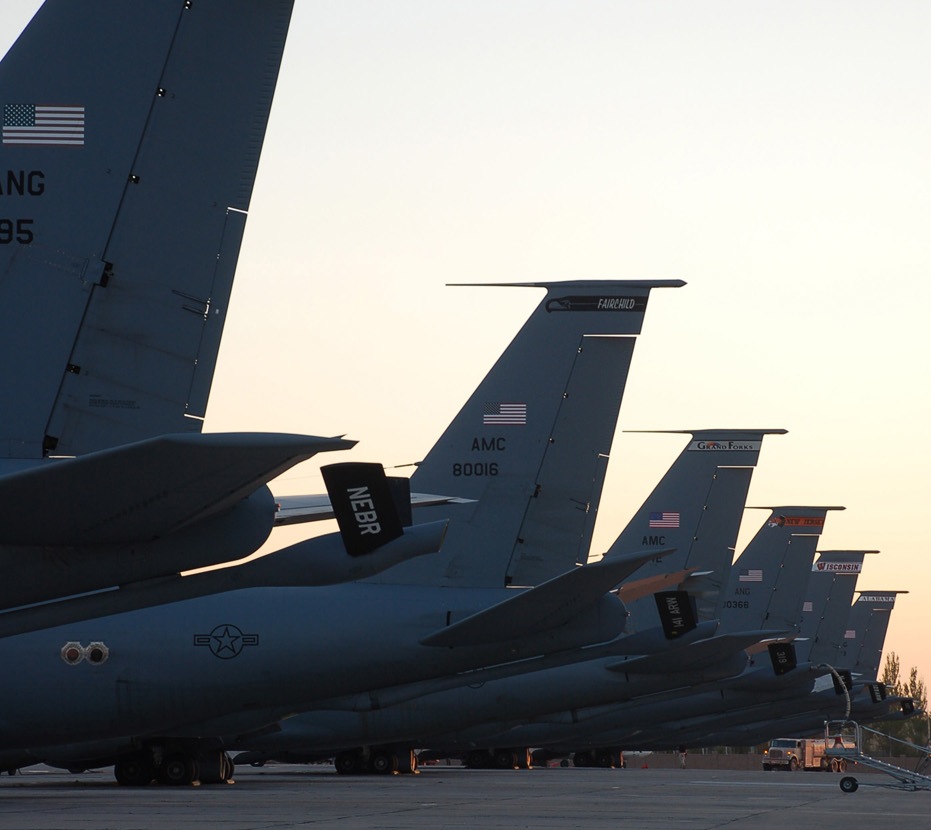Afghanistan Supply Base May Defect to Russia
Kyrgyzstan may have just sold the United States’ rights to Manas Air Base to a higher bidder -- Russia.
Jul 31, 2020161.9K Shares2.4M Views
Planes at Manas Air Base after returning from refueling operations over Afghanistan (manas.afcent.af.mil)
The U.S. might lose access to a crucial hub for supporting the war in Afghanistan.
On Tuesday, Russian news sources quoted Kyrgyzstan President as saying that he had decided to cancel U.S. access to the Manas Air Base, one of two regional air hubs for resupplying U.S. troops in Afghanistan used since the war began in 2001. The United States had lost the other, a base in Uzbekistan called Karshi Khanabad,in 2005 after the Bush administration criticized the Uzbek regime for human rights abuses. As a result, the U.S.’s reliance on Manas has increased to the point where it has become the “primary logistics hub” for the Afghanistan war, providing a staging ground for both troops and materiel, as Air Force Col. Randy Kee, the commander of the 376th Air Expeditionary Wing, toldjournalist Nathan Hodge in 2005.
Illustration by: Matt Mahurin
That may come to an end. “,” President Russian state television during a Tuesday visit to Moscow. The Russian government agreed on Tuesday to provide Kyrgyzstan with a $2 billion loan package, plus $150 million in direct aid — apparently part of a long-standing effort to dislodge the United States from an area it considers within its sphere of influence. By contrast, the United States pays Kyrgyzstan about $60 million annually for use of Manas.
Manas is home to a “24-hour operation” supporting the Afghanistan war, said Vikram Singh, a South Asia expert at the Center for a New American Security who served in the Pentagon during the Bush administration, hosting fuel tankers, cargo and attack aircraft and medical evacuation resources, among other materiel. “This is not a small operation,” he said, adding that the loss of Manas could lead to a reduction in the tempo of military operations. “There’s no way to quantify it, but if you’re a commander on the ground, you’ve got to think that there are several things that aren’t available to you.”
Anthony Bowyer, director of the Central Asia program at the International Foundation for Electoral Systems, a nongovernmental organization focusing on strengthening democratic governance, called the possible loss of the base a “diplomatic victory” for the Russians. “There was tremendous political pressure on President Bakiyev by the Russian Federation” to kick the United States out of Manas, as the Russians are wary of long-term U.S. intentions to host large numbers of NATO troops near its southern border.
Just two weeks ago, the commander of all U.S. forces in the Middle East and South Asia, Army Gen. David Petraeus, visited Kyrgyzstan and told reporters that the U.S. would retain the base. “
At the Pentagon, spokesman Geoff Morrell told reporters that the United States was still in negotiations to retain the base. “It is a hugely important air base for us,” Morrell said. “It provides us with a launching-off point to provide supplies to our forces in Afghanistan.” He would not comment on whether the United States would consider Russia’s efforts to dislodge it from Manas to be a hostile action.
The issue of logistics resupply has proven to be a difficult one for U.S. troops in Afghanistan, a country characterized by mountainous terrain and few paved roads. Land-based supply routes for U.S. and NATO troops that run through Pakistan have come under increasing attack in recent months. On Tuesday, Taliban guerillas destroyed an important bridgethrough the Kyber Pass between Afghanistan and Pakistan used to resupply NATO forces.
Another Pentagon spokesman, Lt. Col. Mark Wright, said the State Department had not informed the Pentagon of any changes in status to U.S. access to Manas and appeared to downplay the prospect of its loss. “We have multiple supply routes, both air and ground” to resupply U.S. troops in Afghanistan, Wright said. “It’s important not to put your eggs in one basket.” He said he would not “give specifics” on the amount of supplies moving through Manas or if there were alternative air supply routes that could handle a comparable load. Bowyer noted that Petraeus’s recent trip through Central Asia had also taken him to Tajikistan, raising that neighbor of Afghanistan as a prospective alternative to Manas.
A State Dept. spokesman, Rob McInturff, said that the agency “has not received formal notification to close the base directly from the [Kyrgyz] government.” McInturff confirmed that U.S. diplomats will “continue to discuss the base with the authorities” in the central Asian country, but said there were no efforts as yet to dispatch any additional U.S. senior officials to underscore the importance of keeping the base. He said that the Pentagon was “very highly involved” in the “ongoing discussions.”
John Pike, a defense expert with Globalsecurity.org, a military analysis organization, said that it was conceivable that Tajikistan’s numerous Soviet-era airbases could be alternatives to Manas. “The challenge is the politics,” he said, noting that the Russian invasion of Georgia this summer — a country that Moscow feared had drifted too far out of its sphere of influence — would make former Soviet republics “tred carefully” before signing deals to host U.S. military supplies.
Additionally, Singh noted that it wouldn’t be as simple as picking up from Manas and moving elsewhere. “There are lots of places that technically could” host U.S. forces, he said, but “there’s been substantial investment into upgrading [Manas] so it can support” the U.S. mission in Afghanistan. “It’s not just like saying, ‘Thanks — Dushanbe, we’re ready to go,’” referring to the capitol of Tajikistan.
“What this shows is how precarious it is running military operations in a landlocked country” like Afghanistan, Singh said.

Rhyley Carney
Reviewer
Latest Articles
Popular Articles

